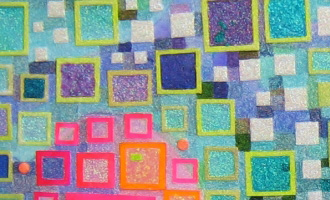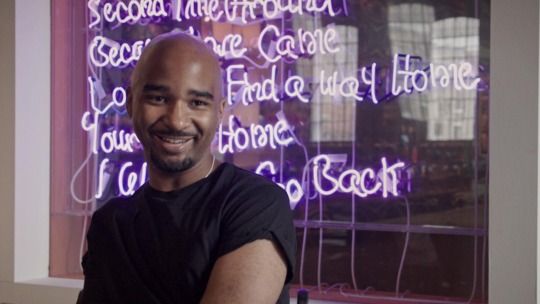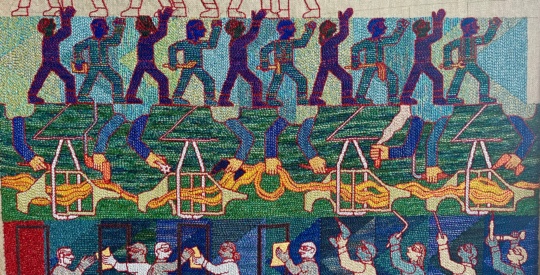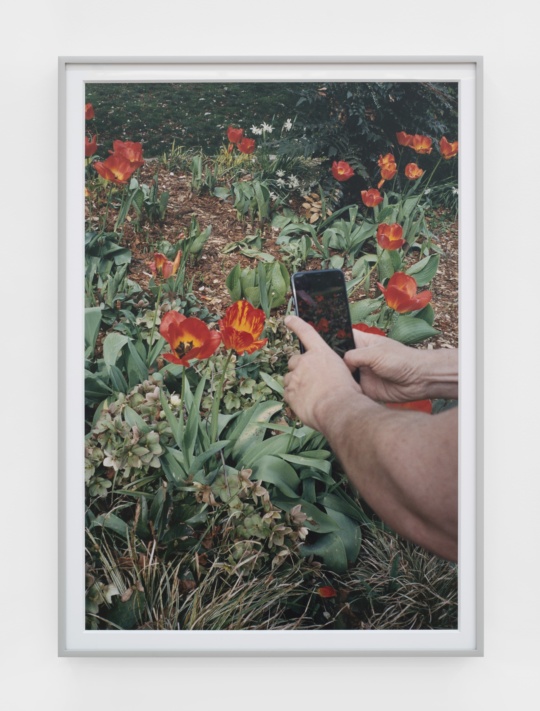
For your summer reading pleasure, BURNAWAY brings you Just Like Suicide, a novel by artist Mery Lynn McCorkle, set in the Los Angeles art world. She writes from experience, having lived for years in Williamsburg, Brooklyn, when it still was the art frontier, and then LA; she now resides in Rome, Georgia. She describes the book as “a compendium of interlocking tales cataloguing self demolition and success in the Los Angeles art scene, from the point of view of artists, dealers and family members.”
We’ll post sequential chapters from McCorkle’s book every Wednesday and Friday over the summer (and on Monday’s beginning in August!). Or click here to buy the book now.
Forty Seven
The day after Barbara spoke with Maggie, she approached Odessa about having drinks. Even without Maggie’s warning, Odessa could see that Barbara was pretty obviously trying to trip her into saying something revealing about Lawrence. On the third clumsy attempt, Odessa gently placed her hand over Barbara’s. “I won’t play this blame game, my dear, because I was honestly fond of him. He’s flawed; I’m flawed; you’re flawed. It’s the human condition to aspire and fail. I won’t hurt him deliberately for being human. And I have to tell you I’ve seen two of your films and they are breathtaking in their cruelty. You cannot treat me like that. I won’t provide you with that kind of footage or sound bites so turn off every one of those recording devices you are hiding or I’m out of here.”
Odessa fully expected Barbara to storm out or make a scene. Instead, perhaps being somewhat stunned by Odessa’s directness, Barbara launched into her often repeated excuse about finding her mother dead in a pool of vomit. Odessa didn’t respond to the recital at all: she smiled and waited for Barbara to continue. Barbara then added, “My mother was selfish and I didn’t much like her, but her death skewed everything in my life.” That at least sounded honest.
Odessa told her flat out, “I admit I didn’t much like your mother either. I guess she reminded me too much of why I left the South. Where I grew up, straight talk was considered rude and bland was worshiped as good taste. Even the most inoffensive shade of blue had to be muted to pass muster in Mississippi. Your mother would have fit right in. I always found blandness to be boring. In my world, boring is real close to being a sin.”
“If Maggie were here, she would tell us that blandness is a virtue in Chinese painting, an honored quality.”
“I’ve gotten that lecture too. I’m not Chinese, though. I like colors with zip. It’s why I tend to prefer California painting to New York’s. Artists here aren’t so afraid of color. And I like people with convictions and intensity. That’s why, despite your efforts to trick me into saying something nasty about Lawrence, I still like you. You are intense and committed to your craft. I admire that. If you want to talk to me, I welcome it but you have to do it as my friend, not as a researcher. So turn off your phone recorder app too.”
Barbara smiled. It was the first smile Odessa had seen on that perky face since, well, since she couldn’t even remember the last time.
“So tell me about your process. Your montage technique is unusual, the way you splice two themes together. Most people would take your ideas and make two documentaries but you are like a surrealist. The juxtapositions keep the viewer constantly vigilant for connectives. What is your inspiration? I’m really curious.”
As Barbara responded to her question with this great rush of words, Odessa was startled to see how fundamentally alike Barbara and Maggie were. How hypersensitive they both were, like their feelers got distorted going through the birth canal and every word, every glance, every touch had more impact, more punch than experienced by other people. To be as sensitive as these two were and have the childhoods they did, no wonder they both seemed somehow off. Maggie was verbally and physically abused. Her father liked hitting and hurting. Her momma was like so many women who stayed in brutal marriages because at least they could say they were married, like that made them something, not realizing they got smaller and smaller to counter the violence. Sometimes pain can be so central it overwhelms all else, making hunks of self shrivel down and hide: that was how Maggie survived. She shut down. Barbara’s abuse was from neglect. Her famous architect father was absentee, much like Odessa’s own father. But Odessa had a mother who asked her opinions, listened, who taught both of her daughters how to cook and function in the world. They were always laughing together. Odessa knew she was loved, even if her father was never there. Barbara had no one who understood her, who listened to her, no one who loved her. She was short and stocky in a family of tall and willowy. Having parents and grandparents who think less of you than a beat-up lawn chair is a form of abuse. Really, her anger and films were a way of fighting being invisible. We aren’t designed to live in a vacuum. We need community, a place to belong. Left alone, abandoned, we turn feral.




